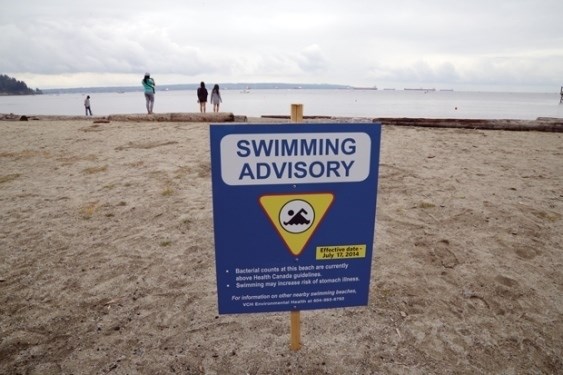The North Shore’s medical health officer is urging Transport Canada to flush its plan to allow vessels to dump their sewage into local waters.
The federal transportation regulator is considering changing its rules to allow boats under 400 gross tonnes certified for fewer than 15 passengers to discharge their toilet tanks within one nautical mile (about 1.8 kilometres) from the shoreline, down from the current three-nautical mile limit.
That would put raw sewage within striking distance of beaches in Vancouver and West Vancouver, both of which had e.coli counts higher than what is considered safe for human contact during the summer of 2014, said Dr. Mark Lysyshyn.
One of the high bacteria counts was attributed to dredging at Dundarave Pier, but the others were never pinned down. Animal feces in natural runoff and boats emptying their tanks too close to shore were prime suspects.
“Will it make the situation worse? We don’t know but it definitely won’t make the situation better,” Lysyshyn said. “It depends on things like temperature and tides and what other contaminants might be in the water at the time, how much they dump.
“It depends if anybody is sick onboard or carrying a pathogen that’s going to make other people sick. It depends on a lot of things but it does introduce risk.”
The new regulation would mainly target pleasure craft, which should be having their liquid waste pumped out in a marina, Lysyshyn added.
Beaches tend to be good for both physical and mental health, Lysyshyn said, and he’d rather not be posting health advisories warning swimmers to keep out.
“We’ll still be monitoring the beaches and we’ll shut the beaches if levels get too high but people like to use the beaches and we don’t like to have them shut,” he said.
Lysyshyn also noted that existing regulations are difficult to enforce by Transport Canada. The federal government should be designating all of Burrard Inlet a “no-discharge” zone, which it has the power to do, he added.
The District of West Vancouver is standing with Lysyshyn, said district spokesman Jeff McDonald.
“We can’t definitely say that this potential decision by Transport Canada would exacerbate the situation because we don’t know that (the high e.coli counts) were specifically caused by marine dumping, however, in a case like this, given that there are so many unknowns, we support the position taken by the North Shore medical health officer,” he said.
Transport Canada could not provide comment by North Shore News deadline.



